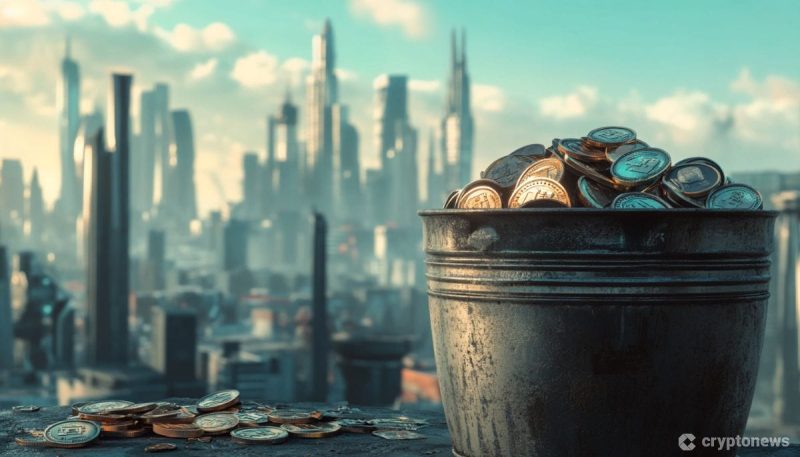Political meme coins and prediction markets have had a defining role in this crypto bull market — driven by the dramatic U.S. election and Donald Trump’s pro-Bitcoin policies.
Coins like TRUMP and MAGA have become vehicles for speculation, rising and falling based on the fortunes of candidates.
Most of the biggest PolitiFi tokens in terms of market cap are linked to the Republican nominee, with those named after Kamala Harris typically having much smaller valuations.
And investing in one certainly isn’t for the faint of heart. “Jeo Boden” hit an all-time high of $1.07 in April but has now plunged by 99.6% after the president abandoned his re-election campaign.
Joe Boden’s price chart. Source: CoinMarketCapNovember’s election has also been huge business for Polymarket, where users can place cryptocurrency bets on a wide range of issues.
A staggering $986.2 million has been wagered on whether Harris or Trump will pick up the keys to the Oval Office in about six weeks’ time, and the race remains on a knife edge.
But once the winner emerges, there’s a bigger question to ask: will political meme coins implode in value, and will prediction markets suffer a sudden and sharp decline in revenues?
Data from @rchen8 on Dune Analytics shows that Polymarket is on track to smash records for monthly trading volume in September — beating last month’s haul of $472.8 million.
But data shows that most of this activity is directly related to the election, with substantially less interest in other markets such as sports and pop culture.
Most Polymarket users bet on the election. Source: @rchen8 on Dune AnalyticsEnthusiasm could also wane for Trump-themed tokens if he fails to secure a second term — especially considering it’s unlikely he would run again in 2028.
Jurica Dujmović is a Weiss Ratings research editor who has been following the volatile world of political memecoins closely. He told Cryptonews:
“The long-term viability of political memecoins is a complex issue. While their current popularity is undeniable, sustainability hinges on their ability to transcend mere novelty. These tokens operate at the intersection of finance and political engagement, which gives them a unique position in the crypto ecosystem. However, their value is largely predicated on speculative interest and fleeting political narratives, which poses challenges for long-term sustainability. For these coins to endure, they would need to evolve beyond their initial premise and develop tangible utility or foster enduring communities. This evolution is not impossible, but it’s a significant hurdle that few have successfully navigated thus far.”
Dujmović believes we’ll see a “recalibration of interest” in the aftermath of the elections, but enthusiasm for such meme coins won’t vanish overnight:
“Political discourse and engagement don’t end with elections.”What Makes Them So Popular?
You may be scratching your head and wondering why such meme coins are so popular in the first place.
Dujmović argues that they’re a novel form of political expression — and allow token holders to feel they’re part of a wider community with like-minded individuals.
There’s no denying either that some investors have been drawn in by the prospect of eye-popping returns, but volatility works both ways and there’s a lot of risk.
Rennick Palley is the foundation partner of Stratos, a hedge fund that has invested in these meme coins in the past. He argues that owning token named after politicians doesn’t necessarily mean you’re aligned with their policies, telling Cryptonews:
“They are not endorsements, they are assets that traders use to express a view on directional events. Boden is a good example — its success and failure was not directly related to the arch of the Biden campaign, although it did die out in the same way but more so from a lack or relevance.”
Palley believes PolitiFi will struggle to maintain relevance after the election, adding: “Memes are inherently ephemeral, and a new meta will emerge to attract attention.”
What Will Happen Next?
Dujmović points out that the trend surrounding political meme coins has mainly been centered in the U.S. so far, but does have the potential to expand globally in the future.
He warned this depends on multiple factors — including crypto regulation in other countries, how widely digital assets are adopted in these economies, and how their political systems work:
“The two-party dominated system in the U.S. lends itself well to this phenomenon. Multi-party systems or less polarized political landscapes might not provide as fertile ground. While some non-U.S. political meme coins exist, they have significantly less traction than their U.S. counterparts. This suggests that while the concept can be exported, its success is not guaranteed and may require adaptation to local contexts.”
A Trump win in November would likely boost the crypto markets — especially considering he’s spoken repeatedly of establishing a Bitcoin reserve in the U.S., and ramping up efforts to ensure America dominates the mining industry. The many coins named after him would also probably experience something of an uplift.
But a loss could mark the death knell for political meme coins, at least in the short-term. New tokens may only start to re-emerge if crypto-friendly presidential candidates start to emerge in the years to come.
The post Is the Party Over for Political Meme Coins? appeared first on Cryptonews.


